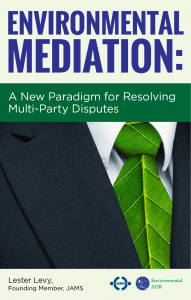 Some of you may already have seen a copy of my new ebook, in which I propose a new paradigm for resolving complex, multi-party environmental disputes. It relies on mediation — not as it has been compromised and incorporated into standard litigation procedures — but as a true and superior alternative to litigation.
Some of you may already have seen a copy of my new ebook, in which I propose a new paradigm for resolving complex, multi-party environmental disputes. It relies on mediation — not as it has been compromised and incorporated into standard litigation procedures — but as a true and superior alternative to litigation.
Why did I write it?
I wrote it because of what is going on in the world today. Because there is an urgent need for a neutral forum and a fair process in which to investigate, discuss and remedy some of the myriad problems that have adversely affected our natural resources and our quality of living. I wrote it because I’ve seen first hand, over the last 25 years, how environmental mediation provides the participants with greater control over their own destinies and a route to achieve settlement outcomes that are more scientifically sound, more cost effective and which can be reached in a more timely fashion compared to tort style legal adjudication, and which are designed to better the environment.
I wrote it to show how mediation provides a unique opportunity to bring together the parties involved in an environmental problem, their representatives, including scientific experts and environmental regulatory agencies, to intelligently assess the conflict, agree on the testing required, agree on the most effective and least costly remedy, and make informed decisions about a fair and equitable allocation of actual costs of investigation and cleanup among the parties.
The e-book describes the general methodology I’ve developed as well as key steps and issues raised along the way, from initiation to final resolution of environment disputes. It includes the presentation of a basic financial model to illustrate the significant financial benefits to be realized through a mediated process instead of proceeding via traditional litigation. I believe strongly that this new paradigm is much better suited to the culture and concerns endemic to environmental regulation and the related dispute resolution needs—current and future. I also believe that many of the ideas discussed here are directly relevant to other types of complex, multi-party commercial disputes, so the potential advantages and benefits of mediation are far from limited to the environmental field. If you are interested in reading it please fill out the form below in order to download a complimentary copy.
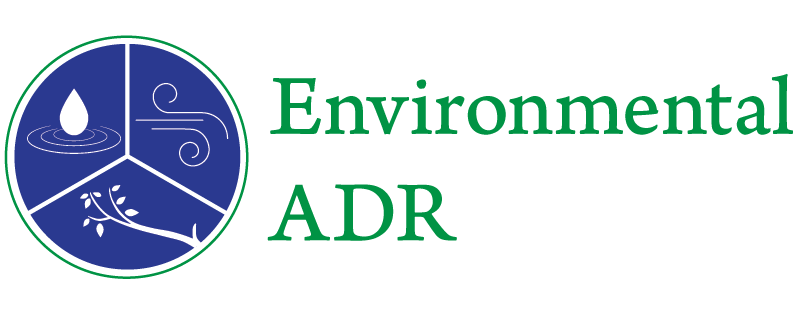
 New York State and City take pride in being leaders and trendsetters when it comes to legislative and regulatory action to protect consumers in a number of areas, including banking and insurance and commercial transactions.
New York State and City take pride in being leaders and trendsetters when it comes to legislative and regulatory action to protect consumers in a number of areas, including banking and insurance and commercial transactions. I just returned from the annual JAMS owners’ meeting where we were treated to a presentation from Brad Heckman of the NY Peace Institute.
I just returned from the annual JAMS owners’ meeting where we were treated to a presentation from Brad Heckman of the NY Peace Institute. Two recent mediations vie for entry into the pantheon of failed mediations. They both suffered from the similar flaws in which one or more parties appeared with no authority to contribute to a joint financial settlement. Both cases were set up as cost sharing negotiations and were briefed as such . . . or maybe they weren’t . . .
Two recent mediations vie for entry into the pantheon of failed mediations. They both suffered from the similar flaws in which one or more parties appeared with no authority to contribute to a joint financial settlement. Both cases were set up as cost sharing negotiations and were briefed as such . . . or maybe they weren’t . . .
 A New York Times
A New York Times 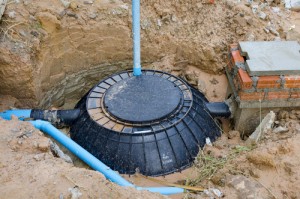
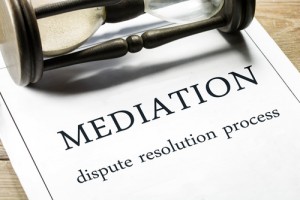 Practitioners in the field of ADR lament that mediation has become increasingly “judicialized” – meaning that it is all too often viewed as just another step on the litigation path toward trial. That was not the prevailing view when I began my mediation practice almost 25 years ago. Mediation was viewed as a uniquely significant settlement opportunity, where the parties came prepared to explore settlement options and to negotiate their way to that end.
Practitioners in the field of ADR lament that mediation has become increasingly “judicialized” – meaning that it is all too often viewed as just another step on the litigation path toward trial. That was not the prevailing view when I began my mediation practice almost 25 years ago. Mediation was viewed as a uniquely significant settlement opportunity, where the parties came prepared to explore settlement options and to negotiate their way to that end. Recent decades have seen a dramatic rise in the use of Alternative Dispute Resolution (ADR) proceedings as a means to evaluate claims and compensate qualified parties in a mass claims settings. These cases can arise from settlements in class or mass actions filed in court or as government-originated programs designed to compensate victims of a military or environmental disaster.
Recent decades have seen a dramatic rise in the use of Alternative Dispute Resolution (ADR) proceedings as a means to evaluate claims and compensate qualified parties in a mass claims settings. These cases can arise from settlements in class or mass actions filed in court or as government-originated programs designed to compensate victims of a military or environmental disaster.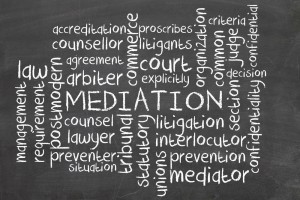 There has been a lot of news recently about large-scale releases of contaminants into the air, water and soil, which have affected large numbers of people and their property. One such example is the discovery of high concentrations of lead in Flint, Michigan’s drinking water system. Another is the ongoing release in Southern California of large volumes of natural gas into the soils below the homes of residents living there. Other examples include the oceanic release of oil into the Gulf of Mexico, and the widespread property damage caused by hurricanes Sandy and Katrina to many thousands of people living in their paths.
There has been a lot of news recently about large-scale releases of contaminants into the air, water and soil, which have affected large numbers of people and their property. One such example is the discovery of high concentrations of lead in Flint, Michigan’s drinking water system. Another is the ongoing release in Southern California of large volumes of natural gas into the soils below the homes of residents living there. Other examples include the oceanic release of oil into the Gulf of Mexico, and the widespread property damage caused by hurricanes Sandy and Katrina to many thousands of people living in their paths.
